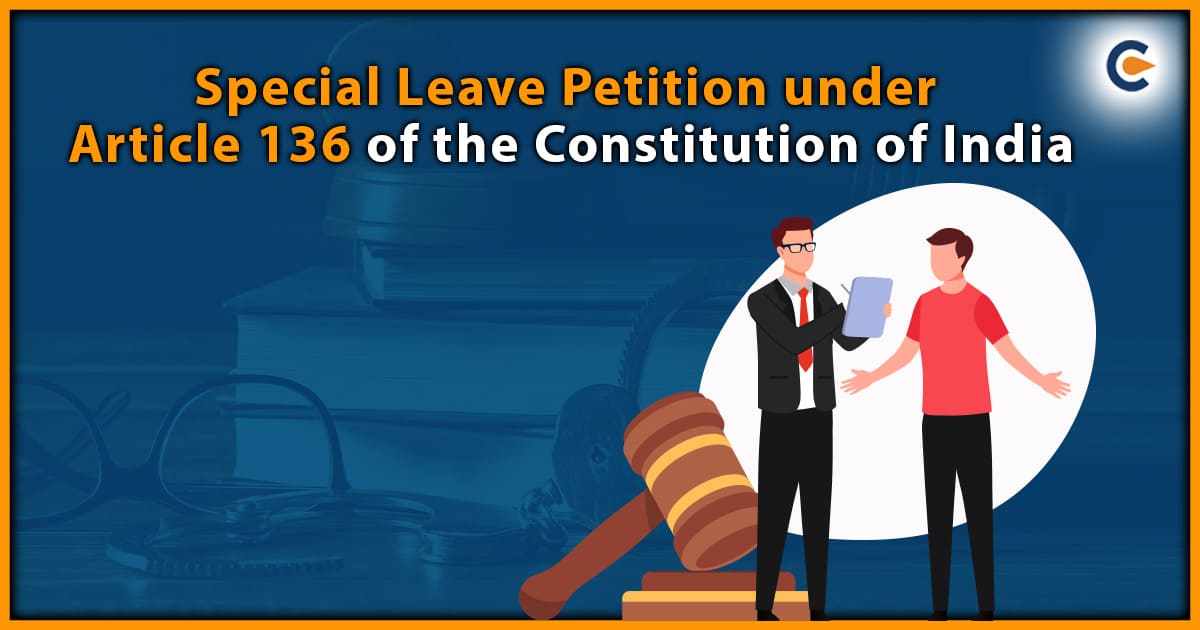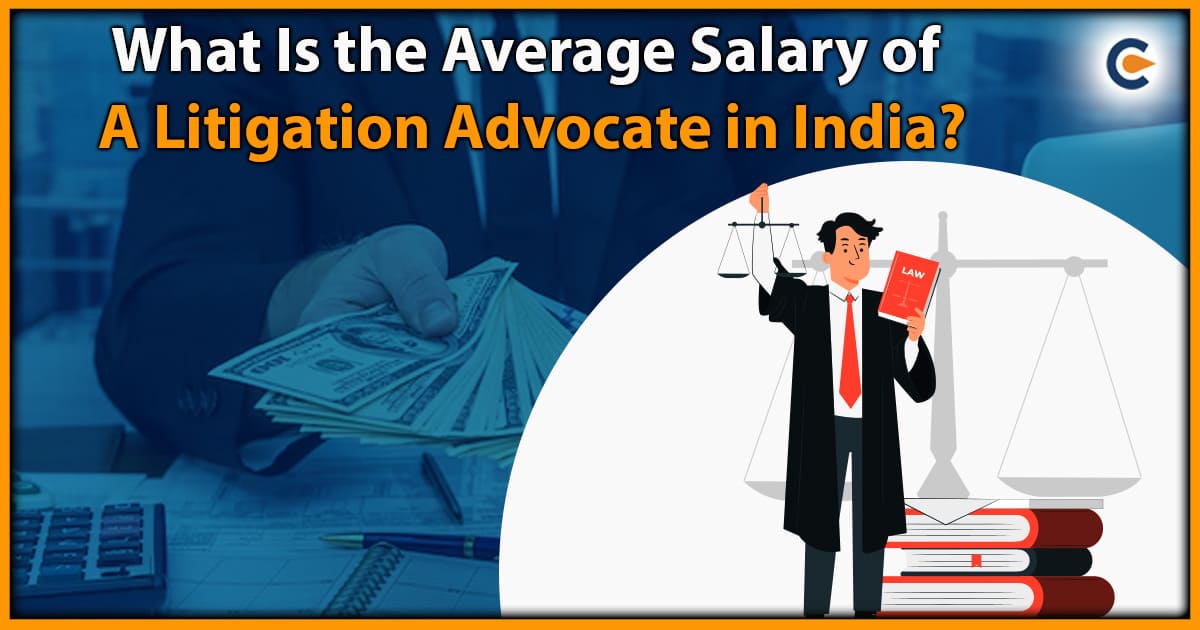Chapter IV of Part V of the Indian Constitution discusses the responsibilities, authority, and abilities of the Supreme Court of India, which is responsible for dealing with appeals related to cases that individuals may not be content with the judgment of the High Court in a specific state. Article 136 of the Constitution provides a solution for such cases. The Supreme Court has the discretion to grant a special leave petition (SLP) after examining the details of the case. This article is not limited to specific cases. Article 136 was formerly known as Draft Article 112 in the Indian Constitution.
The Concept of Special Leave Petition
The term “special leave to appeal” originates from the Government of India Act, 1935 and it allows the affected party to appeal in the Supreme Court of India against any judgment, decree, order, decision, or punishment of a court or tribunal in India. However, this provision does not apply to cases heard in military courts or court-martial, which is similar to the UK Constitution. This privilege is not a guaranteed right for Indian citizens, but it is granted to the Supreme Court under the Indian Constitution. Article 136 of the Indian Constitution allows for the filing of special leave petitions for both final and intermediate orders. Additionally, if a certificate of fitness for appeal under Article 134A of the Constitution is denied by the High Court, a special leave petition can still be filed with the Supreme Court of India[1].
For a Special Leave Petition (SLP) to be considered for granting, it must include all the relevant facts that are necessary for the court’s decision. An Advocate on record must sign the petition, and it must also declare that the petitioner has not submitted any other petition to the High Court.
Significance Of the Term ‘Special’ In Special Leave Petition
A pertinent issue is what sets apart Article 136 from the general appeals available under Articles 132-135 of the Indian Constitution:
- It is not limited to appeals against judgments, decrees, and final orders of the High Court but also covers judgments of lower courts in India.
- It is more flexible than Articles 132-135 and allows appeals against interlocutory and interim judgments.
- Special Leave Petition can be filed in criminal or civil cases, income tax-related cases, cases from various tribunals, etc.
- The appellant is expected to have exhausted all other legal remedies before filing a Special Leave Petition.
- A special Leave Petition can also be filed when a High Court denies the certificate of appeal to the Supreme Court.
Grounds For Special Leave Petition
The wide scope of Article 136 indicates that certainly, reasonable grounds must exist for filing a Special Leave Petition (SLP) in order for it to be accepted by the Apex Court. In the case of Kapildeo Singh v. The King, the Federal Court considered the rulings of the Privy Council and noted the following points:
- Permission to appeal in criminal cases is only granted for clear departure from justice.
- Criminal proceedings are reviewed for legal process disregard, violation of natural justice principles, or grave injustice.
- Mere mistakes, like admitting improper evidence, are not considered grave injustice.
- The court is not concerned with formal rules in criminal matters brought through special leave petitions but looks for miscarriage of justice.
- The court interferes in a criminal trial only for something outrageous or shocking that disrupts justice delivery or when the accused is not given a fair trial and protection of the law.
Procedure For Filing a Special Leave Petition
To file a Special Leave Petition, a party must adhere to the following steps:
- Supreme Court provides a predefined format for Special Leave Petitions in Form No. 28.
- The petitioner must clearly state all relevant facts to convince the Supreme Court that the Special Leave Petition is maintainable, and the aggrieved party has the right to be heard.
- The Special Leave Petition should include personal details, such as name, age, and address of all parties involved, and details of the court or tribunal whose judgment has been challenged.
- The substantial question of law arising in the case should be clearly specified in the petition.
- The grounds for making the appeal must be explicitly mentioned.
- The prayer clause at the end of the petition should specify the relief being sought from the Supreme Court.
- If interim relief is sought during the petition, the party must mention it with the grounds for the relief.
- The aggrieved party must declare that no appeal against the order or decree has been filed.
- An Advocate-on-record must sign the petition.
- The draft of the Special Leave Petition with payment of necessary fees must be filed with the registry along with seven copies.
- The Supreme Court decides whether to grant special leave or not after considering the facts and circumstances of the petition.
- Once the leave to file an appeal is granted, the Supreme Court exercises its appellate jurisdiction and issues a binding decision for the parties involved.
Article 136 Of the Constitution of India
The Supreme Court holds the residual power to hear appeals against judgments made by courts or tribunals throughout the territory of India, except for military courts or court-martials. The Supreme Court is responsible for interpreting the Constitution and its decisions are binding on other courts. It has the authority to uphold the fundamental rights of citizens and strike down any law that is deemed unconstitutional. Due to its extensive powers, the Supreme Court only hears appeals on specific matters to manage the high volume of cases. As a result, the Indian Constitution sets out certain conditions under which an appeal to the Supreme Court can be made. This unique permission allows an affected party to file a petition against any court or tribunal’s decision or order. The term “special leave to appeal” was initially taken from the Government of India Act, 1935, and has since been a topic of discussion, as it provides the Supreme Court with the broadest possible jurisdiction at any point in the legal process.
As per Article 136 of the Constitution, the Supreme Court has the authority to decide whether to grant permission to appeal against judgments, orders, decrees, determinations, or sentences passed by any court or tribunal within the boundaries of India.
Submitting a Special Leave Petition (SLP) is not a guaranteed right for citizens, but a privilege that depends on the Supreme Court’s discretion. The Court has the option to decline the SLP, making it solely an opportunity to request the SLP, with its acceptance entirely up to the Court. Regarding the broad authority of the Supreme Court in this regard, a Constitution Bench in Dhakeshwari Cotton Mills Ltd. v. Commissioner of Income Tax, West Bengal declared that it is not possible to establish the boundaries of this power. Hence, it must be used carefully and only in extraordinary situations. Nonetheless, it is crucial that the Supreme Court performs its responsibility to ensure that no court in the country administers injustice, and if it does, the Supreme Court can be approached. Otherwise, the purpose of Article 136 would be unsuccessful. It is not beneficial to restrict the authority and extent of the Article, but rather to use it carefully.
The Discretionary Power of The Supreme Court Under Article 136 Of the Indian Constitution
Article 136 of the Indian Constitution grants significant power to the Supreme Court, including the following:
- Residual power: The Supreme Court can utilize its residual power under Article 136 to intervene in cases where there has been gross injustice or where a substantial question of law is involved.
- Extraordinary jurisdiction: The article also empowers the Supreme Court to address serious miscarriages of justice, with the authority to pass judgments to provide justice to the aggrieved party.
- Limited jurisdiction: Unlike regular courts, where anyone can file an appeal against the order, judgment, or decree of the High Court or any lower court or tribunal, the Supreme Court does not function in the same way. Instead, it can only be approached in exceptional cases where Article 136 applies.
Thus, it is crucial for a party to approach the court only in exceptional circumstances and not as a regular course of action. Additionally, the power granted to the Supreme Court under Article 136 is discretionary, which means that the court has the authority to decide whether or not to grant permission to file an appeal via a special leave petition, even if it is not a regular course of action.
The Scope of Special Leave Petition Under Article 136
The Indian Constitution grants discretionary power to the Supreme Court of India, which allows it to decide whether or not to grant a special leave petition for an appeal against a judgement or decree made by a court or tribunal in India. The Supreme Court may choose to grant or refuse leave to appeal, as it deems fit. It is not a right for the aggrieved party to claim special leave to appeal from the judgement or decree of the High Court, rather it is a privilege solely vested with the Supreme Court of India. If there is any constitutional or legal issue that requires clarification by the Supreme Court, the aggrieved party may approach the Apex Court under Article 136, which can be heard as a civil or criminal appeal, as applicable. This residual power is specifically vested in the Supreme Court of India.
The Supreme Court can grant a Special Leave Petition (SLP) in civil cases under Article 136, but only if there is a substantial question of law involved or if the issue affects the public interest. As for criminal cases, the Supreme Court will only grant an appeal by way of special leave if there are exceptional circumstances that show grave injustice has occurred, which requires the Apex Court’s intervention. The granting of a Special Leave Petition is a discretionary power and not a matter of right for the parties involved.
Filing Writ Petition After the Dismissal of Special Leave Petition by The Supreme Court
- Filing a writ petition before the High Court after a Special Leave Petition against an order of the Tribunal is a separate proceeding.
- Questions decided by the Supreme Court while dismissing the Special Leave Petition cannot be reopened in a subsequent writ proceeding before the High Court.
- The principle of res judicata or any principle of public policy cannot bar the trial of the same issues in a separate proceeding.
- The writ proceeding before the High Court can be filed even if the Special Leave Petition is dismissed.
- The court should not refuse to consider a writ petition solely based on the ground that a non-speaking order of the Supreme Court dismissed a Special Leave Petition filed by the petitioner.
Conclusion
Article 136 of the Indian Constitution serves two main objectives: ensuring proper administration of justice and finality of interim orders. This provision is flexible enough to achieve both purposes. However, orders that deny special leave to appeal while keeping the legal issue unresolved lack certainty and contradict the article’s spirit. The Court can still address the legal question in appeal under Article 136 once leave is granted, so there is no need to keep it open for the future. Thus, it is advisable that the Court avoids leaving the question of law unsettled while dismissing a special leave petition to ensure both finality and certainty.
Read our Article:Caveat Petition Format In District Court











